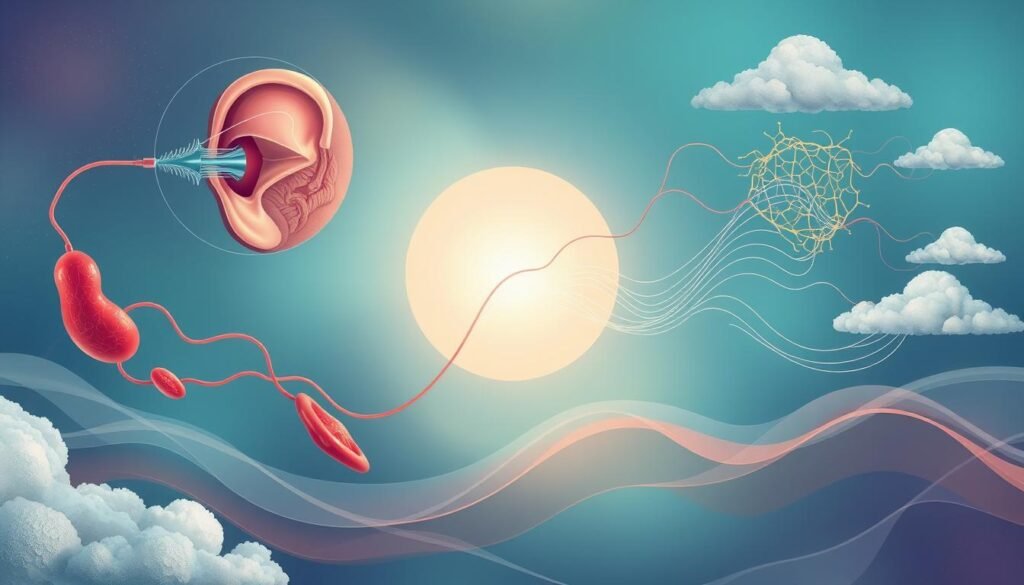Did you know about 15% of U.S. adults—33 million people—report balance or dizziness issues? It’s a big problem for many. Dizziness and fatigue not only make life hard but also decrease the joy in daily activities. To tackle these issues, it’s crucial to look at why they happen. There are many causes of dizziness and fatigue, from ongoing health problems to the way we live. This article will examine how dizziness and fatigue connect, identify their causes, and share effective solutions and treatments for finding relief.
Key Takeaways
- Dizziness and fatigue can significantly affect daily functioning.
- Understanding the causes is crucial for effective treatment.
- Hydration and nutrition play vital roles in managing these symptoms.
- Consulting healthcare professionals can provide personalized guidance.
- Simple lifestyle changes may alleviate symptoms and improve balance.
Understanding Dizziness and Fatigue
Dizziness and fatigue are common issues that affect everyday life. Knowing what they are and their effects is key to managing them well.
Defining Dizziness and Fatigue
The term definition of dizziness includes feelings like lightheadedness, feeling off-balance, or vertigo. Vertigo makes it seem as if everything around you is spinning. Causes range from inner ear problems to migraines or medication side effects. Meanwhile, definition of fatigue means a deep tiredness rest doesn’t fix. It’s a mix of physical and mental weariness, often pointing to health issues.
How Dizziness and Fatigue are Interconnected
The link between dizziness and fatigue is strong because they often stem from the same problems. Low blood sugar, for instance, brings both dizziness and fatigue. It happens when there’s a long gap between meals. Anemia ties these feelings too, as it hampers body’s oxygen flow, making you tired and dizzy.
Plus, people with chronic fatigue syndrome may often feel dizzy. This suggests that low energy levels can mess with your balance and mind.
| Cause | Dizziness Symptoms (%) | Fatigue Symptoms (%) |
|---|---|---|
| Hypoglycemia | 100 | 100 |
| Low Blood Pressure | 70-90 | 60-70 |
| Anemia | Varies | Common |
| Chronic Fatigue Syndrome | Frequent | Common |
| Migraine-Related Dizziness | 30-50 | Varies |
Causes of Dizziness and Fatigue
Dizziness and fatigue stem from many health issues. Knowing these causes helps in managing symptoms. Conditions like chronic fatigue syndrome, low blood sugar, iron-deficiency anemia, migraines, and head injuries play a big role. Each condition has unique ways of causing lightheadedness and extreme tiredness.
Chronic Fatigue Syndrome
Chronic fatigue syndrome leads to lasting tiredness that affects daily activities. After physical activities, people often feel more tired. This creates a cycle of inactivity, worsening the condition. People with this syndrome usually feel dizzy, connecting it to dizziness and fatigue.
Hypoglycemia and Low Blood Sugar Levels
Hypoglycemia, or low blood sugar, causes dizziness, anxiety, and weakness. It’s especially common in those with diabetes. Insulin level changes trigger these symptoms. Managing low blood sugar can reduce dizziness and fatigue.
Iron-Deficiency Anemia
Iron-deficiency anemia means not enough hemoglobin is in the blood. This results in less oxygen reaching the body’s tissues. Symptoms include feeling dizzy and very tired, especially when active. Improving iron intake can make you feel better.
Migraine-Related Dizziness
Migraines can bring about severe headaches and dizziness. About 7% of people with dizziness say it’s because of vestibular migraines. This shows how migraines are linked to feeling unsteady. After a migraine, nausea and tiredness can linger.
Impact of Head Injuries
Head injuries, like concussions, cause dizziness and fatigue. They affect the brain, messing with balance and coordination. People with head injuries need careful checks. This helps avoid long-term problems with dizziness and fatigue.
Symptoms of Dizziness and Fatigue
Knowing about dizziness and fatigue helps us deal with them better. Dizziness makes people feel lightheaded, confused, and unsteady. Fatigue means you’re deeply tired and struggle with daily stuff. Spotting the signs of dizziness early helps treat it. Continuous fatigue worsens your health.
Recognizing the Symptoms
If you’re feeling dizzy or overly tired, watch for specific signs. Symptoms include:
- Lightheadedness and fainting
- Impaired coordination and balance
- Severe tiredness affecting routine activities
- Confusion or disorientation
- Episodes of wooziness
Different issues, like not drinking enough water, low iron, or serious health problems, could cause these symptoms. For more on what to watch for, visit this resource.
Identifying When to Seek Medical Attention
Knowing when to get medical help is vital. Seek help right away if dizziness comes with:
- Slurred speech or confusion
- Severe headache or neck stiffness
- Difficulty moving limbs or loss of vision
- Chest pain or palpitations
These signs could mean something serious, like a stroke or heart issue. It’s key to address dizziness and fatigue fast for your health and safety.
Effective Remedies for Dizziness and Fatigue
Finding the right way to deal with dizziness and fatigue is key. It involves drinking enough water, eating well, and using natural treatments. Each part is crucial for feeling better and improving our health.
Hydration and Nutritional Support
Being well-hydrated is a must. Not drinking enough water can make dizziness and tiredness worse. Make sure to drink plenty of water every day. It helps your body work right.
Eating foods that are good for you is just as important. Foods high in iron like spinach, lentils, and lean meats help if you’re tired because you lack iron. For quick energy, try snacks that have glucose if your blood sugar is low.
Herbal and Natural Remedies
There are natural ways to feel less tired, like using ginger. Ginger can help with nausea and make you feel less dizzy. Ginkgo biloba is good too, as it improves blood flow. Using these remedies regularly can help keep you feeling good.
Importance of Sleep and Rest
Getting enough sleep is a big part of recovering from dizziness and tiredness. Stick to a sleep schedule and make sure your sleeping space is comfortable. Rest is key to getting better.
Relax and give your body the break it needs. Good sleep habits can make you feel more energetic and less dizzy.

Treatment Options for Dizziness and Fatigue
Treatment for dizziness and fatigue depends on the root causes. There are many medical treatments designed to address these causes. Patients often see several doctors before getting the right diagnosis. This leads to a treatment plan made just for them.
Medical Treatments Based on Underlying Conditions
Medical treatments focus on the specific conditions causing dizziness and fatigue. Doctors might suggest the following:
- Vestibular rehabilitation therapy: This therapy helps improve balance and reduce dizziness, especially in patients diagnosed with vestibular neuritis.
- Low-salt diet and diuretics: For those with Menière’s disease, changing lifestyle and taking diuretic medications can help.
- Management plans for chronic fatigue syndrome: These include lifestyle changes, cognitive behavioral therapy, and exercise therapy.
Medications to Alleviate Symptoms
The medications for dizziness depend on the diagnosed condition. Some common treatments include:
| Condition | Medication | Purpose |
|---|---|---|
| Dizziness (general) | Antihistamines (e.g., meclizine) | To relieve motion sickness and vertigo |
| Menière’s disease | Diuretics | To reduce fluid buildup in the inner ear |
| Vestibular migraines | Antidepressants | To manage anxiety and reduce migraine frequency |
| Cognitive issues | Benzodiazepines | To alleviate anxiety-related dizziness |
Therapy and Rehabilitation Options
Therapy is crucial in treating dizziness and fatigue. Rehabilitation choices include:
- Physical therapy: Focuses on exercises that improve balance and coordination.
- Cognitive behavioral therapy: Helps deal with anxiety and psychological issues related to dizziness.
- Occupational therapy: Helps people manage daily activities, reducing the effect of dizziness on life.
Managing Dizziness and Fatigue in Daily Life
Effective management of dizziness and fatigue is possible with daily strategies. Specific exercises and mindfulness can improve well-being. They help people manage their daily life better.
Incorporating Balance and Strength Exercises
Balance and strength exercises are key for dizziness and fatigue. Tai chi and simple balance exercises help with stability. By doing these regularly, older adults can lower their fall risk.
Establishing Healthy Routines
Healthy routines greatly help with dizziness and fatigue. A daily plan with good sleep, balanced meals, and plenty of water boosts energy. Sticking to these routines improves physical health and life management.
Benefits of Mindfulness and Stress Reduction
Mindfulness practices, like meditation and yoga, reduce stress and enhance mental health. These activities increase relaxation. They also help in managing thoughts and feelings that could worsen dizziness and fatigue. Making them part of your daily life supports self-care and boosts wellness.

Lifestyle Changes for Dizziness and Fatigue Relief
Making small but important lifestyle changes can really help with dizziness and fatigue. These steps can boost your health and lessen daily symptoms.
Adopting a Balanced Diet
Eating well is key to combat dizziness and fatigue. Eating iron-rich foods boosts your energy and blood flow. Include fruits, vegetables, whole grains, and protein.
Try eating spinach, beans, and nuts. Drinking plenty of water is also vital. It helps maintain your blood volume, which keeps dizziness at bay.
Limiting Caffeine and Alcohol Intake
Cutting back on caffeine and alcohol can help with dizziness and fatigue. These drinks can make you dehydrated, which often leads to dizziness. Caffeine also makes your blood flow slower, making things worse.
Try herbal teas or water instead to stay hydrated. This can give you steadier energy levels.
Creating a Fall-Proof Environment at Home
Making your home safe is crucial to avoid falls from dizziness. Start by removing clutter and ensuring rooms are well-lit. Use non-slip mats everywhere you can.
Putting grab bars in the bathroom and securing carpets can prevent accidents. These changes make your home safer, making you feel safer and more secure.
Medical Conditions Related to Dizziness and Fatigue
It’s key to know how dizziness links to different medical issues for the right care. Anxiety and brain disorders often lead to feeling dizzy and tired. This shows why a thorough check-up is needed.
Connections to Anxiety Disorders
Anxiety and fatigue can feed off each other, making both worse. Anxiety problems can make your heart beat fast, cause heavy breathing, and make you really sensitive to things around you. This can make you feel dizzy.
To feel better, it’s important to tackle anxiety.
Neurologic Disorders Impacting Balance
Brain disorders can mess with your balance, making you feel dizzy and tired. Diseases like multiple sclerosis and Parkinson’s change the way your body processes senses and moves. This makes it hard to stay steady.
Doctors need to understand this to help you manage dizziness and related health issues.

| Medical Condition | Symptoms | Impact on Dizziness and Fatigue |
|---|---|---|
| Anxiety Disorders | Palpitations, lightheadedness | Exacerbates dizziness and fatigue |
| Multiple Sclerosis | Muscle weakness, vision problems | Worsens balance issues and fatigue |
| Parkinson’s Disease | Tremors, postural instability | Increases risk of dizziness and energy depletion |
| Chronic Fatigue Syndrome | Intense fatigue, sleep abnormalities | Leads to dizziness, especially with physical activity |
Importance of Consulting Healthcare Professionals
If you feel dizzy or tired more often, it’s important to do something about it. Seeing a healthcare professional is key. They can figure out why you’re feeling this way and get you the right treatment. This is especially important for older adults. They face a higher risk of falling and having dizziness problems for a longer time.
When to Seek Help for Symptoms
It’s important to get help if your dizziness comes on suddenly, is very bad, or messes with your daily life. You should also see a professional if you have:
- Dizziness that sticks around even when you try to fix it at home.
- Dizziness that keeps coming back along with feeling tired.
- A history of falling or hurting yourself because you were unsteady.
- New symptoms like headaches, neck pain, or trouble sleeping.
Noticing and acting on these signs can help you manage your symptoms better. This can improve your life a lot.
Preparing for Your Doctor’s Visit
Getting ready for a doctor’s visit can help you get the most out of it. Before you go, you should:
- Write down your symptoms, when they started, how often they happen, and how bad they are.
- Make a list of all the medicines you’re taking and anything you’ve tried to feel better.
- Talk about your medical past, including any other times you’ve felt this way and what you did about it.
- Think of any questions or worries you want to talk about during your visit.
Being prepared helps your doctor understand your situation better. This way, they can make a plan that’s just right for you.
Conclusion
Dizziness and fatigue are deeply connected. Recognizing this can help us understand their causes, like Chronic Fatigue Syndrome, anemia, or orthostatic hypotension. By spotting the signs early, we can better manage these issues.
Dealing with dizziness and fatigue means using various strategies. Including enough water, balanced meals, and good sleep can help. It’s also key to stay in touch with doctors for personalized advice.
If you’re dealing with these symptoms, getting comprehensive care is wise. Using the right strategies and making smart changes can improve your life. For more on dizziness and fatigue, check out this link: understanding the connection between fatigue.